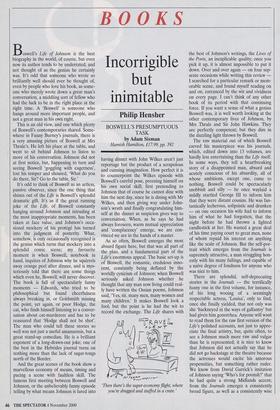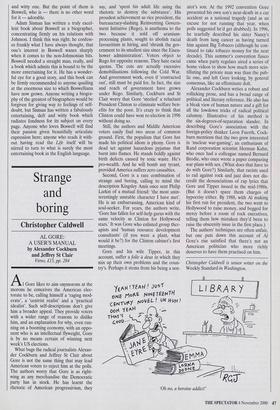Incorrigible but inimitable
Philip Hensher
BOSWELL'S PRESUMPTUOUS TASK by Adam Sisman Hamish Hamilton, £17.99, pp. 392 Boswell's Life of Johnson is the best biography in the world, of course, but even now its author tends to be underrated, and not thought of as the genius he certainly was. It's odd that someone who wrote so brilliantly well should ever be thought of, even by people who love his book, as some- one who merely wrote down a great man's conversation, a middling sort of fellow who had the luck to be in the right place at the right time. A 'Boswell' is someone who hangs around more important people, and not a great man in his own right.
This is an old view, and one which plenty of Boswell's contemporaries shared. Some- where in Fanny Bumey's journals, there is a very amusing picture of Boswell at Mrs Thrale's. He left his place at the table, and went to sit behind Johnson to listen to more of his conversation. Johnson did not at first notice, but, happening to turn and seeing Boswell 'goggling with eagerness', lost his temper and shouted, 'What do you do there, Sir? Go to the table, Sir.'
It's odd to think of Boswell as an artless, passive observer, since the one thing that shines out of the Life is Boswell's splendid dramatic gift. It's as if the great running joke of the Life, of Boswell constantly hanging around Johnson and intruding at the most inappropriate moments, has been taken at face value, and Johnson's occa- sional mockery of his protégé has turned into the judgment of posterity. What, somehow, is only occasionally recognised is the genius which turns that mockery into a splendid comic scene; my favourite moment is when Boswell, notebook in hand, inquires of Johnson why he squirrels away orange peel after dinner, and is mys- teriously told that there are some things which even he, Boswell, will never discover. The book is full of spectacularly funny moments — Edwards, who tried to be philosophical but found cheerfulness always breaking in, or Goldsmith missing the point, yet again, or poor Hodge, the cat, who finds himself listening to a conver- sation about cat-murderers and has to be reassured that 'Hodge shall not be shot'. The man who could tell these stories so well was not just a useful amanuensis, but a great stand-up comedian. He is a brilliant exponent of a long-drawn-out joke; one of the best in the Hebrides journal turns on nothing more than the lack of sugar-tongs north of the Border.
And the great scenes of the book show a marvellous economy of means, timing and pacing a scene with faultless skill. The famous first meeting between Boswell and Johnson, or the unbelievably funny episode telling by what means Johnson is lured into having dinner with John Wilkes aren't just reportage but the product of a scrupulous and cunning imagination. How perfect it is to counterpoint the Wilkes episode with Boswell's careful pose, preening himself on his own social skill; first pretending to Johnson that of course he cannot dine with him the next day, since he is dining with Mr Wilkes, and then giving way under John- son's wrath and finally congratulating him- self at the dinner as suspicion gives way to conversation. When, as he says he had always foreseen, warm mutual appreciation and 'complacency' emerge, we are con- vinced we are in the hands of a master.
As so often, Boswell emerges the most absurd figure here, but that was all part ,of the plan, and a fundamental part of the Life's enormous appeal. The basic set-up is of Boswell, the romantic, credulous inno- cent, constantly being deflated by the worldly cynicism of. Johnson; when Boswell seriously asked. Johnson whether he thought that any man now living could real- ly have written the Ossian poems, Johnson said, 'Yes, sir, many men, many women and many children.' It makes Boswell look a fool; but the point is he had the wit to record the exchange. The Life shares with the best of Johnson's writings, the Lives of the Poets, an inexplicable quality; once you pick it up, it is almost impossible to put it down. Over and over again — on four sep- arate occasions while writing this review I searched for a particular remark or mem- orable scene, and found myself reading on and on, entranced by the wit and vividness on every page. I can't think of any other book of its period with that continuing force. If you want a sense of what a genius Boswell was, it is well worth looking at the other contemporary lives of Johnson, by Mrs Thrale and Sir John Hawkins. They are perfectly competent; but they dim in the dazzling light thrown by Boswell.
The raw material out of which Boswell carved his masterpiece was his journals, which, edited down into 13 volumes, are hardly less entertaining than the Life itself. In some ways, they tell a heartbreaking story of a disappointed man, absurd and acutely conscious of his absurdity, all of whose ambitions, except one, came to nothing. Boswell could be spectacularly snobbish and silly — he once waylaid a mildly startled George III to inform him that they were distant cousins. He was fan- tastically lecherous, solipsistic and drunken — on one occasion his wife had to inform him of what he had forgotten, that the night before he had thrown a lighted candlestick at her. He wasted a great deal of his time paying court to great men, none of whom repaid his interest on anything like the scale of Johnson. But the self-por- trait which emerges from the Journals is supremely attractive, a man struggling hon- estly with his many failings, and capable of a naive degree of fondness for anyone who was nice to him.
There are splendid, self-deprecating stories in the Journals — the terrifically funny one in the first volume, for instance, of his long wooing of a seemingly respectable actress, 'Louisa', only to find, once she finally yielded, that not only was she 'hackneyed in the ways of gallantry' but had given him gonorrhea. Anyone will want to read them for the raw first version of the Life's polished accounts, not just to appre- ciate the final artistry, but, quite often, to see a Johnson much more raw and vulgar than he is represented; it is nice to know that Johnson did not actually say that he did not go backstage at the theatre because the actresses would excite his amorous propensities, but something rather ruder. We know from David Garrick's imitation of Johnson saying 'Who's for poonsh?' that he had quite a strong Midlands accent; from the Journals emerges a consistently broad figure, as well as a consistently wise and witty one. But the point of them is Boswell, who is — there is no other word for it — adorable.
Adam Sisman has written a truly excel- lent book about Boswell as a biographer, concentrating firmly on his relations with Johnson. I think this was right; he confess- es frankly what I have always thought, that one's interest in Boswell wanes sharply when it comes to the non-Johnsonian bits. Boswell needed a straight man, really, and a book which admits this is bound to be the more entertaining for it. He has a wonder- ful eye for a good story, and this book can be firmly recommended to anyone quailing at the enormous size to which Boswelliana have now grown. Anyone writing a biogra- phy of the greatest of biographers would be forgiven for giving way to feelings of self- doubt, but Sisman has written a fabulously entertaining, deft and witty book which radiates fondness for its subject on every page. Anyone who loves Boswell will find their passion given beautifully articulate expression here; anyone who reads it with- out having read the Life itself will be stirred to turn to what is surely the most entertaining book in the English language.



























































































 Previous page
Previous page